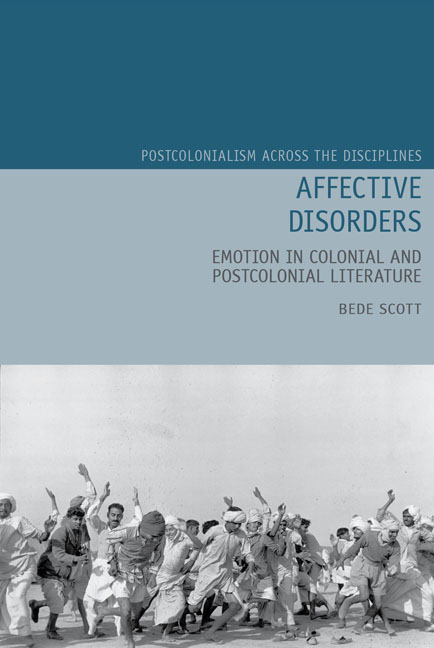Book contents
- Frontmatter
- Dedication
- Contents
- Acknowledgements
- Introduction
- 1 Anger: Naguib Mahfouz's Midaq Alley
- 2 Reticence: Vikram Seth's A Suitable Boy
- 3 Jealousy: Joaquim Maria Machado de Assis’ Dom Casmurro
- 4 Boredom: Upamanyu Chatterjee's English, August: An Indian Story
- 5 Fear: Michael Ondaatje's Anil's Ghost
- 6 Stuplimity: Vikram Chandra's Sacred Games
- Works Cited
- Index
4 - Boredom: Upamanyu Chatterjee's English, August: An Indian Story
- Frontmatter
- Dedication
- Contents
- Acknowledgements
- Introduction
- 1 Anger: Naguib Mahfouz's Midaq Alley
- 2 Reticence: Vikram Seth's A Suitable Boy
- 3 Jealousy: Joaquim Maria Machado de Assis’ Dom Casmurro
- 4 Boredom: Upamanyu Chatterjee's English, August: An Indian Story
- 5 Fear: Michael Ondaatje's Anil's Ghost
- 6 Stuplimity: Vikram Chandra's Sacred Games
- Works Cited
- Index
Summary
The only obligation to which in advance we may hold a novel … is that it be interesting.
Henry James, ‘The Art of Fiction,’ 1884What seems beautiful to me, what I should like to write, is a book about nothing.
Gustave Flaubert, Letter to Louise Colet, 16 January 1852In the first chapter of Flaubert's Sentimental Education (1869), the novel’s protagonist, Frédéric Moreau, takes a leisurely boat trip up the Seine. ‘At every bend of the river,’ we are told, ‘the same curtain of pale poplars came into view. The countryside was deserted. Some little white clouds hung motionless in the sky, and a vague sense of boredom seemed to make the boat move more slowly and the passengers look even more insignificant than before’ (17). As Peter Brooks has observed, this is hardly the most auspicious of opening sequences, for ‘we as readers expect that voyages will lead somewhere, and that the voyagers who fare forth on them will make not only their goal but their experience along the way the source of significance.’ Indeed, ‘[t]o be told that we are scarcely advancing, in the company of the insignificant, makes us wonder why we are to bother at all with a five-hundred-page novel’ (Reading 178). At certain junctures, readers of Upamanyu Chatterjee’s English, August: An Indian Story (1988) may be inclined to ask themselves the same thing. Insofar as it could be said to ‘do’ anything at all, the novel chronicles the experiences of a young civil servant, Agastya Sen, who has been posted to the provincial town of Madna for a year’s administrative training. But if the reader is expecting anything to happen during this purgatorial year in the provinces, if they are anticipating the usual pleasures of an unfolding narrative, they are likely to be sorely disappointed. Right from the outset, we are informed that ‘[t]he district life that [Agastya] lived and saw was the official life, deadly dull’ (28). In the words of another civil service employee, ‘It’s sick [here], there's no one to talk to, no place to go, nothing to do, just come back to your room after office, get drunk, feel lonely, and jerk off’ (88–89).
- Type
- Chapter
- Information
- Affective DisordersEmotion in Colonial and Postcolonial Literature, pp. 105 - 126Publisher: Liverpool University PressPrint publication year: 2019

